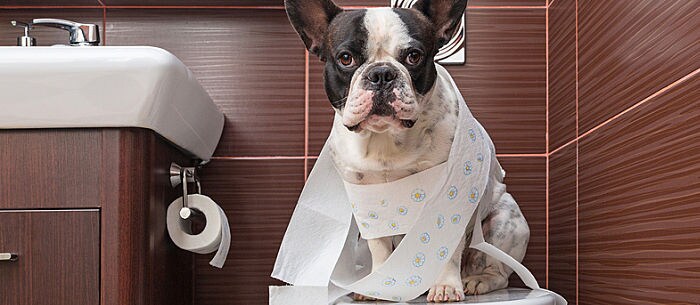Even the cleverest canine has just so many ways of communicating his feelings and, despite the inherent mess, submissive urination is one of them. It’s heartbreaking to see your dog so frightened he lets it all go but this is a common behavior in dogs, as is excitement urination. The mess is the same for both, but the emotions behind them? They are quite different. If you’re wondering why your piddling pooch is behaving this way, here is an explanation of this problem and some tips for eliminating it.
How Do Submissive and Excitement Urination Differ?
“Submissive urination is a dog’s ultimate sign of submission and their way of telling you they’re not a threat or interested in confronting anyone, dog or person they perceive as being more dominant,” says Greg Kleva, a dog behavioral therapist and trainer at Bark Busters Home Dog Training. “It’s seen most often in puppies and younger dogs, especially those with soft personalities who are shy, nervous, timid or fearful.”
Excitement urination, on the other hand, can affect happy dogs of all ages and personality types. It has more to do with weak bladder control, so when they get excited or are greeted exuberantly, they pee a little (or, sometimes, a lot).
Dog behavior expert and the owner of NY Clever K9, Christina Shusterich, agrees. “Both submissive and excitement urination are common for dogs to display upon greeting. Some dogs urinate when they’re excited to see someone, but other dogs do it when they’re fearful or stressed.
If you’re trying to figure out what your dog is doing, take note of his body language. Dogs communicate powerfully via postures and actions,” she says. Observe your dog if you’re not sure how he’s feeling.
Body Language Counts — In You and Your Dog
Dogs that submissively urinate may show fear by trembling and cowering, keeping their heads down and their ears back or licking their lips. They may also cringe or lay on their backs, exposing their bellies. Excited dogs do just the opposite, displaying happiness by jumping and wagging their tails.
“Dogs may submissively urinate as a reaction to people’s movements, which can be innately threatening to them, even if they’re not meant to be. That’s why you should never pet a strange dog on the head,” says Shusterich.
“Whether you suspect your dog is urinating because of submission or excitement, both you and your visitors should avoid approaching him in ways that seem threatening, intimidating or exciting, from a dog’s perspective,” says Kleva, who recommends not doing the following:
- Staring or making direct eye contact
- Leaning over or moving towards the dog
- Reaching for the dog
- Petting from over the top of the dog’s head
- Quick movements
- Exuberant tones of any kind
Dealing with the Deed
A piddle puddle isn’t fun to clean, even if you understand why your dog is doing it. Luckily, eliminating the behavior is possible, no matter what his age. “Whether you’re experiencing submissive or excited urination, never scold your dog.
In puppies, this is completely normal and generally improves with maturity, muscle control and bladder strength. Excitement urination can be avoided by teaching your dog appropriate, calm greetings and eliminating the triggers for it whenever possible.
If the behavior is happening in an older dog and seems atypical, have him checked by a veterinarian to rule out medical issues,” suggests Kleva. “You can also work on managing the situation as best you can, by taking your dog out on a walk shortly before visitors arrive or by letting him greet visitors outside,” he adds.
If the problem isn’t new in an older dog, you may have to undo past damage. “Adult dogs are more likely to exhibit the behavior if they’ve been trained through harsh methods,” says Kleva. “When training, be firm when necessary, but never appear threatening or yell at your dog and always greet him calmly.”
Shusterich uses behavior modification to change fear to enjoyment by using a gentle tone and calming the dog down. “You can flip a dog’s emotions through voice and affection,” she explains.
Training your dog not to do the deed at the wrong time can work, especially if you have a positive, “we’re in this together” attitude. And, of course, you are.
For other puddles, read House Training a Puppy for tips on training your dog in this all-important skill.
Corey Kagan Whelan is a freelance writer living in New York. She shares her life with two kids and two rescue dogs. One of them has a (bit of) a piddling problem.



